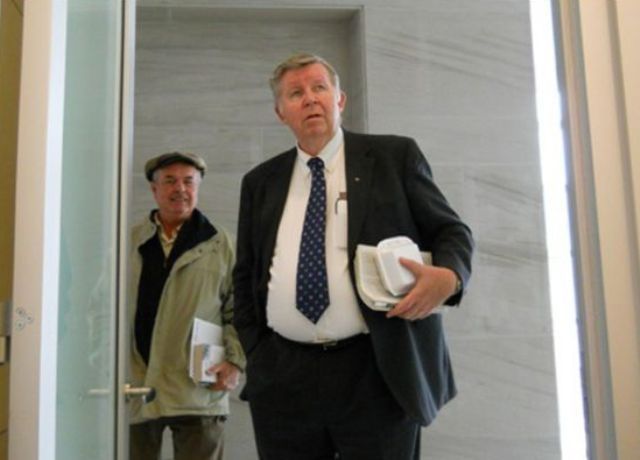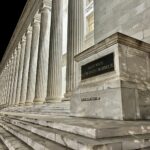Senate confirms Richard Federico to 10th Circuit as Biden’s second appointee

The U.S. Senate on Monday confirmed Richard E.N. Federico to the federal appeals court based in Denver by a vote of 61-29, adding a second public defender to the powerful circuit court.
The U.S. Court of Appeals for the 10th Circuit hears federal cases arising from Colorado, Oklahoma, Kansas, Utah, New Mexico and Wyoming. Federico’s confirmation restores the court’s membership to its full roster of 12 active judges for the first time in over two years.
Federico, of Kansas, succeeds Mary Beck Briscoe, a Bill Clinton appointee who took a form of semi-retirement known as senior status in March 2021. He is President Joe Biden’s second appointee to the court, following Judge Veronica S. Rossman of Colorado – the only former public defender currently serving on the 10th Circuit.
After Federico is sworn in, the court will have seven active judges appointed by Democrats and five appointed by Republicans. Federico was the second candidate the White House backed for Briscoe’s seat. The first, Jabari Wamble, was a prosecutor and son-in-law of a Democratic congressman who Biden unsuccessfully nominated to a circuit court, then a trial court judgeship.
All sides of the courtroom
Federico comes to the bench with an unusual resume of litigating high-profile criminal cases as a federal public defender and serving as a prosecutor, defense attorney and judge in the military justice system.
“Rich has had an impressive 21 years of service, including 13 years on active duty, in the Navy’s judge advocate corps,” said U.S. Sen. Jerry Moran, R-Kan., to the Senate Judiciary Committee in September. Moran’s office solicited Federico for the vacancy early this year.
During his third year of law school at the University of Kansas, the 9/11 terror attacks prompted Federico to pursue a career in the Navy’s Judge Advocate General Corps and the military justice system. He gained trial experience, first as a prosecutor in Norfolk, Va., then overseas in Europe and Asia.
In 2008, the Navy assigned him to defense work, and he made more than 20 trips to Guantánamo Bay in Cuba, where he argued on behalf of Mohammed Kamin, an alleged “unlawful enemy combatant,” and Ramzi Binalshibh, an alleged co-conspirator in the 9/11 plot.
Later, Federico became a part-time Navy judge, and led the criminal investigation into the 2020 arson of the USS Bonhomme Richard in San Diego. Federico indicated in his Senate questionnaire that he intends to continue serving in the Navy Reserve law program, as long as it does not conflict with his duties as a 10th Circuit judge.
In 2015, Federico started work as a federal public defender in Oregon, then transferred to the Kansas office in 2017. He represented a Kansas soldier accused of disseminating bomb-making instructions over social media, a California man who fraudulently enlisted police to shoot someone in an act known as “swatting,” and a man convicted of conspiring to kill members of a Somali Muslim community in Western Kansas.

In response to questions from senators, Federico wrote that his judicial philosophy has three components: respect for everyone involved in the appellate process, maintaining his integrity as a judge and deciding cases as narrowly as possible. He added that judges should not make decisions based on their empathy toward the litigants.
“However, empathy can be a valuable tool to foster a respectful judicial temperament,” Federico clarified.
Asked if he believes the United States is a “systemically racist country,” Federico responded that he thinks the U.S. is “the greatest country in the world.”
“I also believe,” he continued, “that Americans can continuously work to form a more perfect Union for all citizens while acknowledging our nation’s history of slavery and de jure racism.”
Republicans skeptical of defense work
During his confirmation hearing in September, several Republican members of the judiciary committee slammed Federico’s advocacy on behalf of criminal defendants, similar to the approach they took with Rossman during her 10th Circuit nomination two years ago.
U.S. Sen. Josh Hawley, R-Mo., referenced the criminal prosecution of Charles Gann, who is serving a nearly 14-year sentence for the distribution of child pornography. As Gann’s lawyer, Federico argued for a sentence of approximately nine years, citing several mitigating factors.
“What would you say to the victims in this case?” Hawley asked. “Do you think that’s a sentence that does justice for his victims?”
Federico responded that it is the trial judge who ultimately imposes an appropriate sentence on a defendant.
“I’m asking asking about your judgment here,” Hawley retorted. “That sounds to me like you know it was bad idea. It was way low. Way, way low. And now you can’t defend it.”
U.S. Sen Mike Lee, R-Utah, also drew attention to a blog post Federico authored in response to multiple executive orders on immigration early in the Trump administration. In his write-up, Federico advised there is no right to counsel in deportation proceedings, and those at risk of detention should have a plan for their children, gather appropriate documentation and “Know Your Rights.”
“As best I can tell, this is more of a political statement,” Lee said, characterizing Federico’s advice as a roadmap for “breaking of the law.”
Other senators defended Federico’s work experience. U.S. Sen. Peter Welch, D-Vt., himself a former public defender, thanked Federico for his role in maintaining the “integrity of our judicial system.” Moran, the GOP senator from Federico’s home state, also called it important that defense counsel “hold the government to its highest standard in defense of our civil liberties.”
Although Federico’s confirmation leaves no vacancies on the 10th Circuit, there are two George W. Bush appointees on the court who are eligible to take senior status, along with one Barack Obama appointee, Judge Scott M. Matheson Jr. of Utah.














